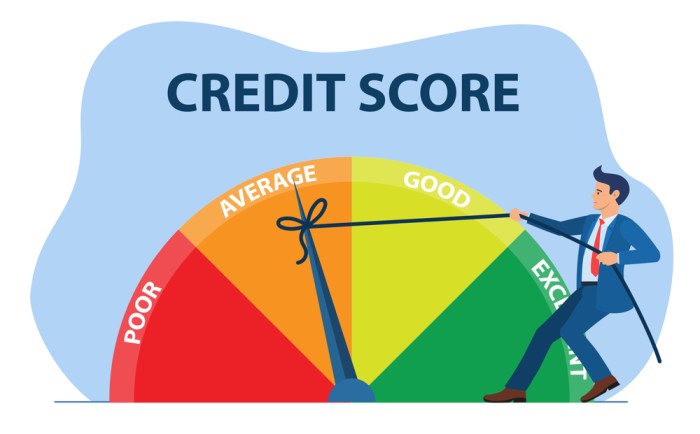Yo, peeps! Let’s dive into the world of credit score improvement where financial health meets opportunity. Get ready for some top-notch tips to level up your credit game!
Now, let’s break it down and explore the ins and outs of boosting that credit score for a brighter financial future.
Importance of Credit Score Improvement

Improving your credit score is crucial for maintaining good financial health. A higher credit score can open up a world of opportunities and benefits that can positively impact your financial future.
Impact on Loan Approvals and Interest Rates
Having a good credit score significantly increases your chances of getting approved for loans, whether it’s for a car, a home, or any other major purchase. Lenders use your credit score to assess your creditworthiness and determine the interest rate they will offer you. A higher credit score can result in lower interest rates, saving you money over the life of the loan.
Access to Better Financial Opportunities
A higher credit score can lead to better financial opportunities such as being approved for higher credit limits, better credit card offers, and even better insurance rates. It can also make it easier to qualify for rental properties and secure favorable terms on leases. By improving your credit score, you are setting yourself up for a more secure financial future.
Factors Affecting Credit Scores
When it comes to credit scores, several key factors play a crucial role in determining an individual’s creditworthiness. These factors can have a significant impact on whether someone is approved for loans, credit cards, or other financial products.
Payment History
Your payment history is one of the most important factors that influence your credit score. It reflects how consistently you make on-time payments towards your debts, such as credit card bills, loans, and mortgages. Late payments or defaults can significantly lower your credit score, while a history of timely payments can boost it.
- Positive Impact: Making all payments on time and in full can improve your credit score over time.
- Negative Impact: Missing payments or defaulting on loans can severely damage your credit score.
Credit Utilization
Credit utilization refers to the amount of credit you are using compared to the total amount of credit available to you. It is recommended to keep your credit utilization below 30% to maintain a healthy credit score. High credit utilization can signal financial distress and negatively impact your credit score.
- Positive Impact: Keeping your credit utilization low shows financial responsibility and can improve your credit score.
- Negative Impact: Maxing out credit cards or carrying high balances can lower your credit score.
Strategies for Credit Score Improvement
Improving your credit score is essential for financial stability and access to better borrowing options. By following these strategies, individuals can take proactive steps to boost their credit scores.
Importance of Paying Bills on Time
- Make sure to pay all your bills on time, as late payments can negatively impact your credit score.
- Set up automatic payments or reminders to ensure you never miss a payment deadline.
- Consistently paying bills on time demonstrates responsible financial behavior to lenders and can help improve your credit score over time.
Reducing Debt
- Focus on paying off high-interest debts first to reduce overall debt and improve your credit utilization ratio.
- Avoid maxing out credit cards and aim to keep your credit utilization below 30% of your available credit limit.
- Consider consolidating debts or negotiating with creditors to create a manageable repayment plan.
Tips for Monitoring Credit Reports and Disputing Errors
- Regularly check your credit reports from all three major credit bureaus (Equifax, Experian, TransUnion) to spot any errors or fraudulent activity.
- If you find any inaccuracies on your credit report, file a dispute with the credit bureau to have the errors corrected.
- Monitoring your credit reports can help you stay informed about your credit standing and take necessary actions to improve your credit score.
Benefits of a Higher Credit Score
Having a high credit score comes with a multitude of benefits that can positively impact your financial well-being. Let’s explore the advantages of maintaining a good credit score and how it can save you money in the long run.
Lower Interest Rates
One of the biggest advantages of having a higher credit score is the ability to secure loans or credit cards at much lower interest rates. Lenders view individuals with high credit scores as low-risk borrowers, leading to better terms and lower interest rates on loans. On the other hand, individuals with lower credit scores may face higher interest rates, resulting in significantly higher costs over the life of a loan.
Access to Better Opportunities
A high credit score opens doors to a wide range of opportunities, including better credit card offers, higher credit limits, and more favorable terms on loans. With a good credit score, you are more likely to be approved for competitive credit cards with lucrative rewards and benefits, giving you access to exclusive perks that can help you save money in the long term.
Save Money in the Long Run
By maintaining a high credit score, you can save a substantial amount of money over time. Whether it’s through lower interest rates on loans, reduced insurance premiums, or better deals on mortgages, a good credit score can lead to significant savings. Even a small difference in interest rates can add up to substantial savings over the life of a loan, making it financially advantageous to have a high credit score.
